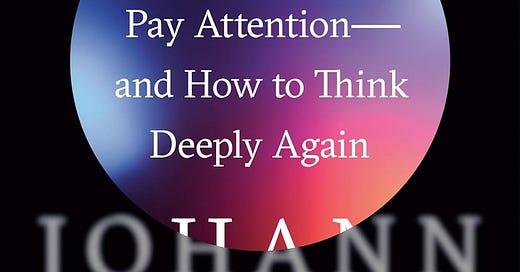In general, I think it would be fair to describe myself as very agreeable and very open to intellectual persuasion, so just after I’ve read a book, I tend to be a bit too over-enthusiastic about it. But even discounting these factors, I’d still say that Johann Hari’s is a very interesting book that I recommend you should read.
As the title makes pretty clear, this volume is about the perceived loss of focus and attention in our current society, its possible causes and solutions. After introducing the concept of an attention crisis, the author starts a journey through different experts and areas that might be contributing to the problem. The first and most obvious culprits, and the ones that stick more in my mind after reading, are multitasking and digital distractions. We are bombarded by social apps whose purpose is to catch our attention as much as possible, which are explicitly engineered by the wisest minds in Silicon Valley for that very purpose and which have been designed with Behaviorist mechanisms to pander to our brain’s rewards mechanisms. The fast pace of news, information, living stops us from entering deep states of ‘flow’, where we can think deeply and creatively. We also live in more stressful societies with overworking and undersleeping, all of which also contribute to being more distracted and paying less attention. Other agents also get their due, like bad food, air pollutants, excessive medicalization (especially stimulants which are too eagerly employed for ADHD), overprotection and control of young people… you name it.
The book also proposes many specific solutions to many of these issues, although bringing them all together is a call for a collective effort, involving individuals, policymakers, and society at large, to restore our ability to focus and engage deeply with the world. He leaves readers with a message of hope, emphasizing that change is possible if we take concerted action.
As I stated at the beginning, I liked the book very much, and as an immediate follow-up, I uninstalled all social apps from my mobile, and am trying to calculate and restrict my time online. Still, I don’t think I am one of the worse sufferers of the spell of lost focus - I am old enough to have lived as a youngster in a world without computers and mobile phones, an addicted and constant bookworm with a low-stress job and living in a quite green countryside.
While halfway through the book, I was going to give it very high rating, but after checking some information about the veracity of some of the data, going through the last chapters and some reflection, I ended up on a less vibrant note. I do want to point out a couple of things that, in my humble opinion, detract from the book’s overall persuasiveness and value:
I didn’t get a clear picture of the relatively hierarchy of importance and degree to which the many factors the book goes through that impair our attention. As a rule of thumb, I’ve tended to assume ones that were dealt with first and/or in greater depth, like social media puppeteering, are more important. The book would profit by stating approximate estimates of relevance and also of tractability. For example, getting facebook and google not to traffic with our information seems relatively doable, with some state intervention and a changes in the business model. Eliminating particles from the environment or progressive ‘hands-off’ schools feels more intractable.
Ultimately, I feel the book should engage more in the importance of economic trade-offs. In the last chapter, the author throws his weight behind economic degrowth, making a case that our capitalist obsession with economic growth has to be curtailed if we ever hope to stop the loss of focus and to maintain a sustainable world. I consider myself as left-of-center, so sympathetic to some degree to the authors thesis and proposals, but I still feel they go too overboard with regulations and restrictions that are impracticable and would have very negative effects for society if attempted. Free markets and capitalism have the necessary engines of the enormous growth in wealth, health and equality that our world has witnessed since the Industrial Revolution. Not only is there no alternative to them, but attempting to over regulate can have very deleterious effects in the long term. As an example, one can compare the US and the EU as two, quasi-experimental examples of a freer and more prosperous society versus a more regulatory and stagnant one. I am very happy to live in Europe and enjoy our regulations and social safety net, but with our really stagnant rates of economic growth, I am unsure we will be able to sustain this in the future.




